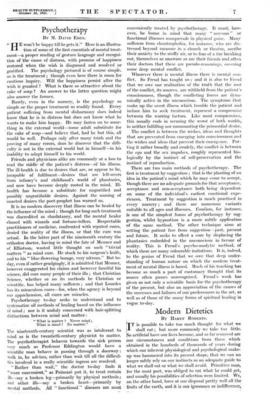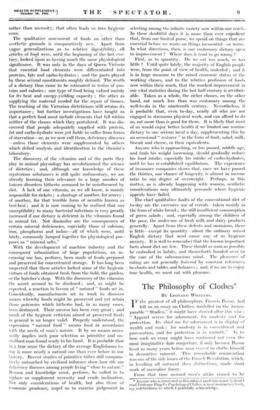Modern Dietetics
BY HARRY ROBERTS.
,1 T is possible to take 'too much thought for what we i shall eat ; but more commonly we take too little. So artificial have our lives become, and so far removed are .our. circumstances and conditions from those which 'obtained in the hundreds of thousands of years during which our inherent physiological and psychological make- up was hammered into its present shape, that we can no longer safely rely on our instincts as an adequate guide to what we shall eat or what we shall avoid. Primitive man, for the most part, was obliged to eat what he could get, and usually his possibilities of selection were limited. We, on the other hand, have at our disposal pretty well all the fruits of the earth, and it is our ignorance or indifference,; rather than necessity, that often leads us into tvgienie error.
The qualitative assessment of foods on other than aesthetic grounds is comparatively new.-' Apart from vague _generalizations as to relative_ digestibility, all article_ Q of food were,. until the beginning of -the last cen- tury, looked upon as having much the same physiological significance. It-was only in the days of queen Victoria that essential food elements were differentiated into proteins,' fats and carbo-hydrates ; and the parts played by these several constituents roughly defitied. _The worth of a dietary: thus tame to be estimated' in terms of pro- teins and calories ; one type of food being valued mainly for its heat and energy-yielding capacity ; the other as supplying the material needed for the repair of tissues. The teaching of the Victorian dieteticians still retains its importance ; but further investigations have taught us that a perfect food must include elements that fall within neither of the classes which they postulated. It was dis- covered that people adequately supplied with protein, : fat sand carbo-hydrate weruet liable to suffer from forms . • of starvation—or, as we now Call them, deficiency diseases —unless those elements were supplemented by others which defied -analysis and identification in the eheniist's laboratory.
The discovery; of the vitamins and of the parts they play in animal physiology has revolutionized the science of dietetics ; and, although our knowledge of these mysterious substance's is still quite rudimentary, we are already learning their relevance to a large number of human- disorders hitherto assumed to be uninfluenced by diet. A lack of one vitamin, as we all know, is mainly; responsible for rickets ; a shortage of another, for scurvy ; of another; for that -terrible form of neuritis known as and it is now coining to be realized that our susceptibility to many bacterial infections is very greatly increased if our dietary is defiCient in the vitamins found in animal fat. Not dissimilar are the consequences of certain • mineral deficiencies, especially those of calcium,! iron; phosphorus and iodine—all of which were, until lately, commonly lumped together for -physiological put- poses as " mineral salts."
With the development of machine industry and the consequent urbanization of large populations, an in- creasing use has, perforce, been made of foods prepared and preserved for concentrated storage. It has long been - suspected that these articles lacked some of the hygienic virtues of foods obtained fresh from the field, the garden, or the butcher's shop. With the discovery of the vitamins the secret seemed to be disclosed ; and, as might be expected, a reaction in favour of " natural " foods set in.: Coincidently, manufacturers. set to work to discover means whereby foods might be preserved and yet retain those potencies which hitherto had, in so many cases, • been destroyed. Their success has been very great ; and much of the hygienic criticism aimed at preserved foods i in general is no longer valid. Properly understood, the expression " natural food " means food in accordance with the needs of man's nature. It by no means neces- sarily implies such poor selection as priMitive and un- civilized man found ready to his hand. It is probable that in a true sense the dietary of the average Englishman to- • day is more nearly a natural one than ever before in our history. Recent studies of primitive tribes still compara- tively untouched by civilized influence show how rife are deficiency diseases among people living " close to nature." Reason and knowledge must, perforce, be called in to replace or supplement necessity and crude inclination. Not only considerations of health, but also those of economic prudence, impel us to exercise judgement in selecting among the infinite variety now within our read'. In these doubtful days it is more than ever e*edient that, from our-limited pnise; we spe4ci on things that are essential before we waste on things inessential—or worse. .In what directions, then, is our customary dietary open to improvement? Where does it tend to go wrong ? .
First, - as to quantity. Do we cat too much, or too little ? Until quite lately, the majority of English people were, from the point of view of health, underfed ; and it is in large measure to the raised economic status of the working classes, and to the relative profusion of foods now within their reach, that the marked improvement in our vital statistics during the last half-century is attribut- able. Taken as a whole, the richer classes, on the other hand, eat much less than was customary among the well-to-do in the nineteenth century. Nevertheless, it is probable that, even to-day, nearly all who are not engaged in strenuous physical work, and can afford to do so, eat more than is good for them: -- It is likely- that most of us would enjoy better health if we limited our routine dietary to one serious meal a day, supplementing this by an occasional " restorer " in the form of fruit, salad, milk, biscuit and cheese, or their equivalents.
Anyone who, is approaching, or bas passed, middle age, and finds his weight increasing, should .gradually . reduce his food intake, especially his intake of carbo-hydrates, until he has re-established equilibrium. The experience of insurance companies shows that, once we have passed 'the thirties, 'milt-chance of longevity is almost in inverse ratio to onr.-deg.ree of overweight. • Perhaps, in this Matter, as' is already happening with women, aesthetic considerations: may ultimately persuade where hygienic appeals. have .
The chief -qualitative faults of the conventional diet of to-day are the excessive use of cereals—taken mainly in the form of white bread ; the still insufficient consumption of green salads ; and, especially among the children of the poor, the under-use of fresh milk and dairy products generally. - Apart from these defects and omissions, there is little—except its quantity—about. the ordinary mixed English dietary that need cause any of us hygiCnic anxiety. It is well to remember that the known important facts about diet are few. These should as soon as possible be 'embodied in habits, and thenceforth handed over to the care of the subconscious mind. The pleasures of eating are not generally fostered by constant references to charts and tables and balances ; and, if we arc to enjoy true health, we must eat with pleasure.



















































 Previous page
Previous page